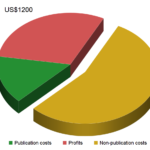or: how journals are like 1930s Rolls Royce Phantom IIs
Recently, the “German Science and Humanities Council” (Wissenschaftsrat) has issued their “Recommendations on the Transformation of Academic Publishing: Towards Open Access“. On page 33 they write that increasing the competition between publishers is an explicit goal of current transformative agreements:
publishers become publication service providers and enter into competition with other providers
This emphasis on competition refers back to the simple fact that as content (rather than service) providers, legacy publishers currently enjoy monopolies on their content, as, e.g., the European Commission has long recognized: In at least two market analyses, one dating as far back as 2003 and one from 2015, the EC acknowledges the lack of a genuine market due to the lack of substitutability:
it is rare that two different publications can be viewed as perfect substitutes, as there are differences in the coverage, comprehensiveness and content provided. Therefore, in terms of functional interchangeability, two different publications could hardly be regarded as substitutable by the end-users, the readers. On that basis, the Commission found that consumers will rarely substitute one publication for another following a change in their relative prices
or
Publications for different academic subjects are clearly not substitutable from the reader’s point of view. Even within a given discipline, there may be little demand side substitution from the point of view of the individual academic between different publications.
As this lack of substitutability is one of the main sources of the problems associated with academic publishing today, not just the German WR, but many initiatives around the globe see increased competition among publishers as key to moving forward.
As much as these aspects appear uncontroversial to the point that one can find similar wordings in many different texts on the topic, what seems to be lacking from many of these texts is one crucial aspect of the practical consequences of competition: procurement rules demand that tenders be held for products and services above a certain value.
Traditionally, the products of publishers have been exempt from such rules by the “single/sole source exemption”: because the journals sold by the publishers constitute monopolies, there is no substitutability, no competition and hence no way to organize a tender. All of this changes, of course, once the goal is to transform academic publishing into a market with substitutability and hence, competition, as per the public statements in the documents surrounding many “transformative agreements”. Once there is substitutability and the value of the transaction exceeds a given limit, procurement rules mandate tenders.
Heeding their assessment of academic publishing as a conglomerate of monopolies if it is based on content, rather than services, the EC opted for a tender when they became a customer with academic publishing needs. The result of this tender is “Open Research Europe” a platform where EU-funded researchers publish for free. Clearly, procurement rules would demand that all institutions follow the example of the EC and stop their negotiations with publishers and hold analogous tenders instead.
One may argue that authors ought to be able to choose their publication venue and I agree, of course. there should not be any restrictions on the choice of publication venue. However, arguably, this does not necessarily entail that the public purse must reimburse authors for even their most extravagant publication choices, if reasonable substitutes exist.
An analogy may help explain the argument: In many areas of science, transportation is needed for small groups of students and faculty to do field research. According to procurement rules, a tender would be organized and the award may, for instance, go to a company that sells electric vans, seating seven passengers and a driver, and offers a ten year warranty. Many would probably agree that the cost of some tens of thousands $/€ for each van is reasonable, given the functionality of the vans and their climate-friendly propulsion. Faculty, however, claim that because these vans do not carry enough prestige, each van must instead be replaced with eight 1930s Rolls Royce Phantom II, such as this one:

Without such prestige, the faculty argue, they cannot work, risk their careers and funding. Arguments that these ancient vehicles are unreliable, unaffordable and dysfunctional are brushed away by emphasizing that their academic freedom allows them to drive whatever vehicle they want to their field work. Moreover, they argue, the price of around one million is “very attractive” because of the prestige the money buys them.
With this analogy, it becomes clear why and how tenders protect the public interest against any individual interests. In this analogy, it is likely also clear that academic freedom does not and should not trump all other considerations. In this respect, I would consider the analogy very fitting and have always argued for such a balance of public and researcher interests: academic freedom does not automatically exempt academics from procurement rules.
Therefore, ten experts advocate a ban on all negotiations with publishers and, instead, advocate policies that ensure that all publication services for public academic institutions must be awarded by tender, analogous the the example set by Open Research Europe and analogous to how all other, non-digital infrastructure contracts are awarded.













Comments are closed.